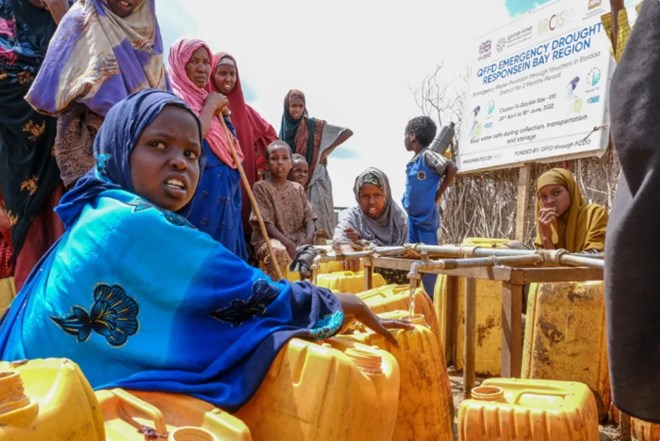
Louise Boyle
Thursday November 10, 2022

Isha Kerow, left, and other Somalis displaced by drought fill jerrycans with water distributed by the Norwegian Refugee Council, on the outskirts of Baidoa, in Somalia last month (AP)
The world has looked away from the spiralling global hunger
crisis for too long, David Miliband has warned, as the “telltale signs” of
famine loom in East Africa.
During the first week of the global climate summit Cop27,
the president of the International Rescue Committee (IRC) travelled to East
Africa to draw attention to a humanitarian disaster fueled by a climate-driven
drought.
Ethiopia, Somalia and Kenya are facing the longest-running
drought in 40 years. Water sources are drying up, crops are failing and cattle
are dying in a place where agriculture and small-farm holders are the norm.
Humanitarian appeals are dangerously underfunded. In
Ethiopia, a lack of money has meant that food rations for refugees have been
cut in half. Of what international support there is, the overwhelming majority
has come from the United States.
“The US, who take a whacking quite often and sometimes for
good reason, are the only country who stepped up on this hunger crisis in East
Africa,” Mr Miliband told The Independent. “The Americans are leading and no
one is following.”
The war in Ukraine appears to have taught the US that they
need to do more to support vulnerable places amid the global hunger crisis, he
said.
On the other hand, the United Kingdom had been absent in
financial support for East Africa, he added. “The lesson that the UK seems to
have taken is to do less. That’s how you end up with the UK playing no
effective role at this moment of real danger.”
Mr Miliband spoke on Wednesday from a “very bumpy road” in
eastern Ethiopia, near the Djibouti border, dotted with local militia
checkpoints.
“This is an area where there is significant evidence of
climate change,” he said.
He described the drive alongside fields of sorghum plants, a
basic commodity in the region, which were emaciated and yellowed at the roots.
The region is experiencing its fifth consecutive failed rainy season, according
to the World Meteorological Organisation.
“There’s also the indirect effects,” he added. “The
conflicts over territory in this part of the world are also conflicts over
resources.”
East Africa is uniquely vulnerable to the global
“poly-crisis” of climate change, the pandemic, and the war in Ukraine as it
relies on Ukraine and Russia for 90 per cent of its wheat imports. Severe
droughts also now happen more frequently with three major events in the past
decade.
This year, for the first time in its history, the IRC added
an urgent alert on East Africa to its emergency watchlist of countries most at
risk of a new emergency or worsening humanitarian crisis.
Since that warning, the situation in Somalia, Ethiopia, and
Kenya has worsened with 21 million people starving.
The situation is not yet a famine - as per the data-driven
standards of classification needed for such a declaration - but it is on the
horizon.
“In 2011, half of the 250,000 people who died did so before
the famine was declared,” Miliband noted.
“There should be no hiding behind the idea that level three
or four food insecurity is okay. The idea that we should wait until level five
- which is famine - before taking action is just terrible.”
And local communities are keenly aware that their
environment has become hostile, he said.
At one of IRC’s village-run sustainable water projects, one
woman in her 30s spoke of the changes. “She said, ‘I remember when the climate
was different. I remember when the water pressure was higher,’” he said.
“What changed? Lake Haramaya is basically gone. It was a
source of fishing and food. There’s a long-term trend here that is absolutely
evident.”